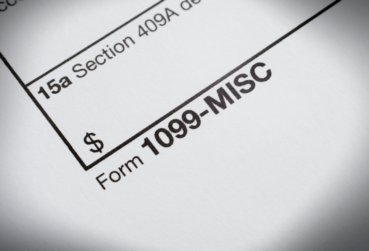Six Tax Reduction Strategies for the End of 2022

Charlie Miracle, CPA, Member, and Director of Client Accounting Services
By: Charlie Miracle, CPA, Member, and Director of Client Accounting Services
There are at least 1040 reasons not to enjoy doing your taxes. However, tax planning plays a critical role in your overarching financial plan, and you should never be paying more than what is required by law. Every year, you have until December 31 to set yourself up for success for next year's filing and incorporate tax planning strategies aimed to help you keep more of what you earn. Here are six areas to check, review and complete before next year's Tax Day.
Plan by Projecting
Projecting. Forecasting. Predicting. It's all the same and equally important. A projection of your future income is critical to help you understand your finances, plan accordingly and act as a tool to guide future financial decisions. Start by looking at your income and deduction information from your last tax return and adjust with new or current information you have. An income projection gives you a solid road map to predict your estimated tax payments and plan for future expenses, especially if your income could be lower or your household is experiencing reduced cash flow.
Consider a Roth IRA Conversion
A Roth IRA conversion can be a valuable tool for lowering your taxes over a period of time, but whether it's the right move for you depends on your unique financial situation. For a Roth IRA, contributions you make are on an after-tax basis, and withdrawals are tax-free and allow you to turn a traditional IRA or 401(k) plan account into a Roth. This gives you flexibility when managing cash flow and future tax exposure because you're trading off being taxed today on the converted amount in exchange for not being taxed on the amount, as it may grow in the future when you withdraw. You can act on this anytime during a calendar year, but it can be wise to initiate during market weakness when your current income is potentially lower than the previous year. Since a Roth conversion increases taxable income in the conversion year, drawbacks can include a higher tax bracket, more taxes on Social Security benefits, higher Medicare premiums, and lower college financial aid. Speak with your financial advisor to learn more.
Review Your Retirement Contributions
Tax-advantaged retirement accounts (such as a 401(k) or a traditional IRA) grow over time with pre-tax funds, and any contributions you make to your account lower your taxable income. For the current tax year, the maximum allowable 401(k) contribution limit is $20,500 up to age 49 and $27,000 for age 50+ ($6,500 catch-up contribution). For the current tax year, the maximum allowable IRA contribution limit is $6,000 up to age 49 and $7,000 for age 50+ ($1,000 catch-up contribution). If you cannot make the maximum contribution to your retirement account, aim to contribute the amount your employer will match.
Maximize Tax-Advantaged Vehicles
Tax-advantaged vehicles are savings plans or accounts that provide investors a tax benefit such as a tax deferral or exemption. You might be most familiar with a 529 college savings plan or a health savings account (HSA). It's critical to take advantage of your deductible contributions first and make sure you're maximizing the contributions, if possible. Look to max out your 529 plan to receive state tax benefits and your HSA account if you have low healthcare costs. By maximizing your contributions to an HSA, the funds you contribute are yours to keep and will roll over year over year and allow you an opportunity to put those savings toward retirement or a long-term care plan. If you're looking to reduce your taxable income, you can exclude annual contributions from taxes up to the limits placed by the Internal Revenue Service (IRS).
Bunch Your Charitable Contributions
Charitable giving strategies can provide you the opportunity to give the maximum amount you can to charity while also receiving tax benefits for yourself. "Bunching" involves consolidating tax-deductible contributions typically made over multiple years into a single tax year. You can contribute through a donor vehicle, such as a donor-advised fund (DAF) and get a tax deduction by itemizing on your tax return. The standard deduction for federal income taxes is $12,950 for a single filer and $25,900 for married filing jointly in 2022. If you're looking to benefit from itemized deductions through a charitable gift, your deductions should add up to more than the standard amount.
Harvest Investment Losses
There are certain steps you can take to maximize your net returns on your investments. One example is tax-loss harvesting, which typically is thought of as an end-of-the-year exercise or applied year-round during market dips and when rebalancing your portfolio. It refers to identifying and selling an asset that has performed below its purchase price. The difference between the amount you initially paid for the asset and the sell price is then applied against future capital gains to help lower your tax bill. Up to $3,000 can be applied annually with any additional amount carried over to subsequent years. Applying tax-loss harvesting can be complex, and it's best to contact your financial advisor who has strong tax knowledge at their fingertips to see if this is the right strategy for you.
Taxes are inevitable. By working through this end-of-year checklist and collaborating with a tax-smart financial advisor, you're setting yourself up to operate in a manner that aims to reduce your tax exposure. Our team at Cordell, Neher & Company, PLLC, stays updated on ever-changing tax laws and has worked with individuals, families and business owners since 1988 to help reduce tax liabilities.
Events & Deadlines
Latest Past Events
Community Service Day
Cordell Neher & Company, PLLC 175 E Penny Rd #1, Wenatchee2024 Shred Event
Cordell Neher & Company, PLLC 175 E Penny Rd #1, WenatcheeCNC Newsletter
Subscribe and stay informed on policy changes that could have an impact on you.
Footer Contact
Check the background of your financial professional on FINRA's BrokerCheck®
Privacy & Usage: The information on the Cordell, Neher & Company, PLLC website is provided with the understanding that it should not be substituted, in any way, for consultation with a professional Certified Public Accountant, accountant, tax, legal or other competent advisor. Cordell, Neher & Company, PLLC makes every attempt to ensure that the information contained on their websites are obtained from reliable sources, but is not responsible for any errors and/or omissions or from the results obtained from the use of any information. This site contains links to servers maintained by other organizations. Cordell, Neher & Company, PLLC cannot provide any warranty regarding the accuracy or source of information found on any of these servers, the content of any file the user might use to download from a third-party site, and is not responsibility for the content found on any of these servers or for any links these servers maintain with other servers.
Avantax affiliated advisors may only conduct business with residents of the states for which they are properly registered. Please note that not all of the investments and services mentioned are available in every state. Securities offered through Avantax Investment ServicesSM, Member FINRA, SIPC, Investment Advisory services offered through Avantax Advisory ServicesSM,Insurance services offered through an Avantax affiliated insurance agency. 3200 Olympus Blvd., Suite 100 Dallas, TX 75019 972-870-6000.
Avantax financial professionals may only conduct business with residents of the states for which they are properly registered. Please note that not all of the investments and services mentioned are available in every state. Securities offered through Avantax Investment Services.SM, Member FINRA, SIPC. Investment Advisory Services offered through Avantax Advisory Services SM. Insurance services offered through an Avantax affiliated insurance agency. Method 10® is property of Avantax Wealth Management.SM All rights reserved 2020. The Avantax family of companies exclusively provide investment products and services through its representatives. Although Avantax Wealth Management does not provide tax or legal advice, or supervise tax, accounting or legal services, Avantax representatives may offer these services through their independent outside business. This information is not intended as tax or legal advice. Please consult legal or tax professionals for specific information regarding your individual situation.
The Avantax family of companies exclusively provide financial products and services through its financial representatives. Although Avantax Wealth ManagementSM does not provide or supervise tax or accounting services, Avantax Representatives may offer these services through their independent outside business. Content, links, and some material within this website may have been created by a third party for use by an Avantax affiliated representative. This content is for educational and informational purposes only and does not represent the views and opinions of Avantax Wealth ManagementSM or its subsidiaries. Avantax Wealth ManagementSM is not responsible for and does not control, adopt, or endorse any content contained on any third party website.
This information is not intended as tax or legal advice. Please consult legal or tax professionals for specific information regarding your individual situation. Investments & Insurance Products: Are not insured by the FDIC or any federal government agency- Are not deposits of or guaranteed by the bank or any bank affiliate- May lose Value
Avantax Investment ServicesSM and Avantax Advisory ServicesSM are not affiliated with CNC Financial Group, LLC.
© 2024 Cordell, Neher & Company PLLC • Designed by Pixel to Press











